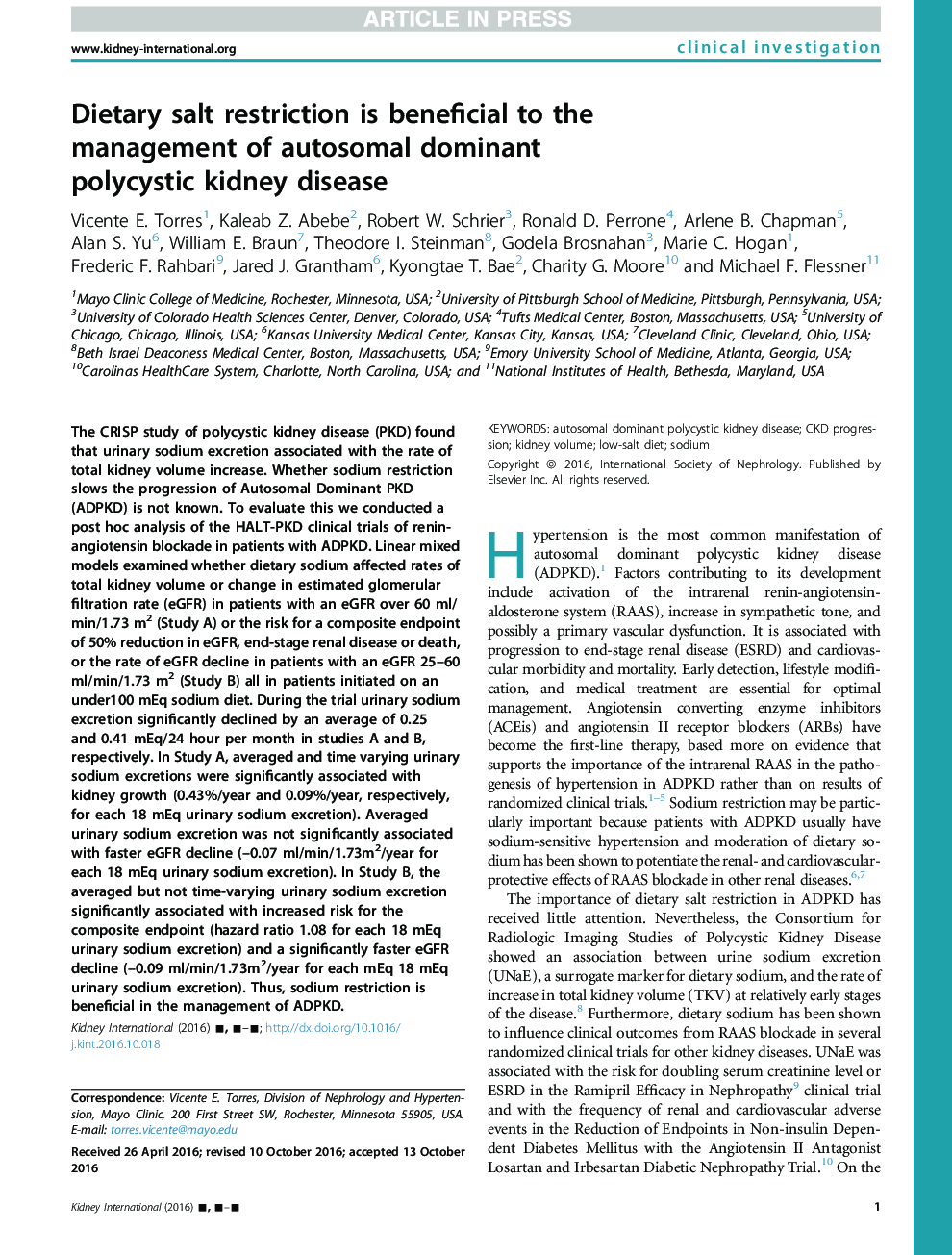| کد مقاله | کد نشریه | سال انتشار | مقاله انگلیسی | نسخه تمام متن |
|---|---|---|---|---|
| 5688981 | 1409966 | 2017 | 8 صفحه PDF | دانلود رایگان |
عنوان انگلیسی مقاله ISI
Dietary salt restriction is beneficial to the management of autosomal dominant polycystic kidney disease
دانلود مقاله + سفارش ترجمه
دانلود مقاله ISI انگلیسی
رایگان برای ایرانیان
کلمات کلیدی
موضوعات مرتبط
علوم پزشکی و سلامت
پزشکی و دندانپزشکی
بیماریهای کلیوی
پیش نمایش صفحه اول مقاله

چکیده انگلیسی
The CRISP study of polycystic kidney disease (PKD) found that urinary sodium excretion associated with the rate of total kidney volume increase. Whether sodium restriction slows the progression of Autosomal Dominant PKD (ADPKD) is not known. To evaluate this we conducted a post hoc analysis of the HALT-PKD clinical trials of renin-angiotensin blockade in patients with ADPKD. Linear mixed models examined whether dietary sodium affected rates of total kidney volume or change in estimated glomerular filtration rate (eGFR) in patients with an eGFR over 60 ml/min/1.73 m2 (Study A) or the risk for a composite endpoint of 50% reduction in eGFR, end-stage renal disease or death, or the rate of eGFR decline in patients with an eGFR 25-60 ml/min/1.73 m2 (Study B) all in patients initiated on an under100 mEq sodium diet. During the trial urinary sodium excretion significantly declined by an average of 0.25 and 0.41 mEq/24 hour per month in studies A and B, respectively. In Study A, averaged and time varying urinary sodium excretions were significantly associated with kidney growth (0.43%/year and 0.09%/year, respectively, for each 18 mEq urinary sodium excretion). Averaged urinary sodium excretion was not significantly associated with faster eGFR decline (-0.07 ml/min/1.73m2/year for each 18 mEq urinary sodium excretion). In Study B, the averaged but not time-varying urinary sodium excretion significantly associated with increased risk for the composite endpoint (hazard ratio 1.08 for each 18 mEq urinary sodium excretion) and a significantly faster eGFR decline (-0.09 ml/min/1.73m2/year for each mEq 18 mEq urinary sodium excretion). Thus, sodium restriction is beneficial in the management of ADPKD.
ناشر
Database: Elsevier - ScienceDirect (ساینس دایرکت)
Journal: Kidney International - Volume 91, Issue 2, February 2017, Pages 493-500
Journal: Kidney International - Volume 91, Issue 2, February 2017, Pages 493-500
نویسندگان
Vicente E. Torres, Kaleab Z. Abebe, Robert W. Schrier, Ronald D. Perrone, Arlene B. Chapman, Alan S. Yu, William E. Braun, Theodore I. Steinman, Godela Brosnahan, Marie C. Hogan, Frederic F. Rahbari, Jared J. Grantham, Kyongtae T. Bae, Charity G. Moore,